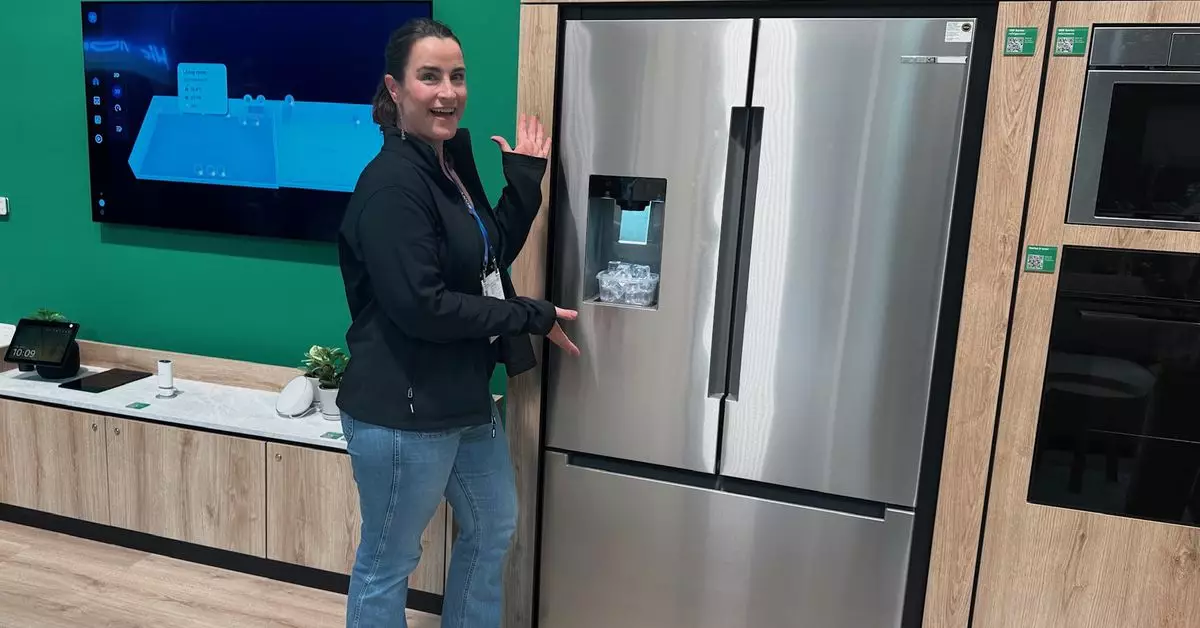As technology continues its relentless march forward, the concept of a fully-connected home has shifted from a fantasy to a tangible reality. The introduction of the Matter standard—an initiative designed to unify the myriad of smart home devices—has paved the way for enhanced interoperability among appliances. At this year’s Consumer Electronics Show (CES), Bosch took a significant step forward by showcasing its first Matter-enabled appliance, the 100 Series French Door Bottom Mount Refrigerator. Set to revolutionize how consumers interact with their kitchen appliances, this refrigerator symbolizes the future of connected living.
Launched in November and anticipated for US release this coming spring, Bosch’s 100 Series French Door Refrigerator is priced at $2,500. What sets this model apart is its built-in chip that supports the Matter protocol, enhancing its connectivity and functionality. As we increasingly rely on technology for convenience and efficiency, this refrigerator will allow users to manage and monitor its performance remotely. Through an upcoming firmware update, functionalities will expand to include real-time notifications and remote temperature controls—a leap towards smarter living.
Matter represents a pivotal change in the smart home landscape, prioritizing local connectivity over cloud reliance. By creating a seamless exchange of data between devices, the standard enhances both the speed and security of operations. Currently, Matter’s compatibility is largely supported by platforms such as Samsung SmartThings and Home Assistant, with Amazon pledging support later this year. On the contrary, Google Home and Apple Home have yet to unveil their plans regarding Matter support, leaving users in suspense about future integrations.
This local-first approach of Matter compatibility not only makes operations more efficient but also addresses growing concerns about data privacy. With the increased risks associated with cloud-connected devices, the need for local control has never been more pressing. The 100 Series, thus, stands at the forefront of this movement, exemplifying how manufacturers are adapting to meet consumer demand for security and efficiency.
Bosch’s commitment to integrating Matter is not a standalone effort; rather, it reflects a broader vision for smart home appliances under the BSH Group, which encompasses brands such as Siemens and Thermador. Eelco Lammertink, a representative from BSH, has indicated that the introduction of Matter’s capabilities will extend across all Bosch, Siemens, and Thermador appliances. The rollout plan involves introducing Matter to new appliance categories over the next few years, culminating in a comprehensive suite of Matter-enabled devices by 2026.
One noteworthy feature that stands out is the promise of energy management capabilities. By enabling energy reporting and facilitating participation in a Matter-connected home energy management platform, Bosch is not just marketing a refrigerator but rather integrating it into a larger narrative around sustainable living. This commitment is particularly relevant in an era where energy efficiency and sustainability are top priorities for consumers.
Challenges and Limitations
While the advancements associated with Matter-compatible appliances are commendable, Bosch has acknowledged certain limitations. Existing appliances will not receive updates to make them Matter-compatible due to the technical hurdles involved, a disappointment for consumers already invested in the brand’s products. Lammertink candidly explained that the complexities of such upgrades could risk “bricking” existing devices—rendering them inoperable and leading to considerable consumer dissatisfaction.
Bosch’s unveiling of the 100 Series French Door Refrigerator at CES marks an exciting chapter in the evolution of smart home technology. By aligning itself with the Matter standard, Bosch not only enhances its product offerings but also embraces a more secure and efficient future for connected devices. As the market progresses, the importance of smart home interoperability will likely grow, setting the stage for manufacturers to innovate further. The commitment from brands like Bosch demonstrates a promising trajectory, ultimately leading to more cohesive smart home experiences that can enrich our everyday lives. As other manufacturers follow suit, consumers can look forward to a future where their appliances are not just tools but smart partners in navigating daily routines.

